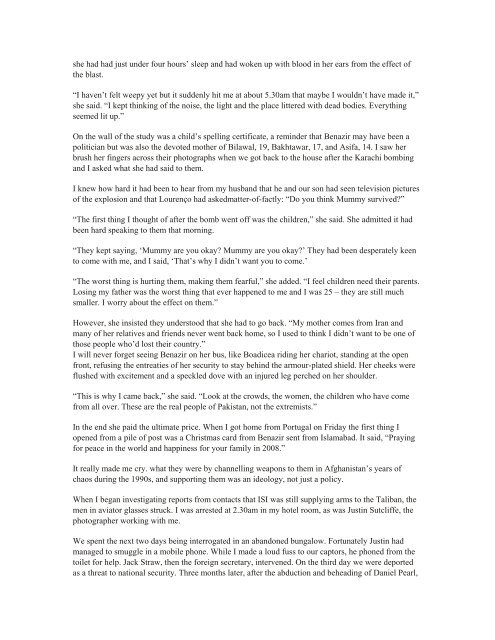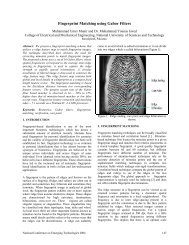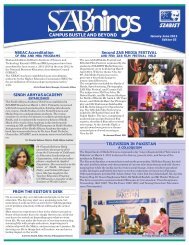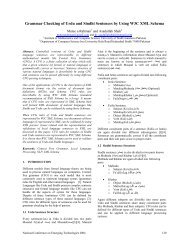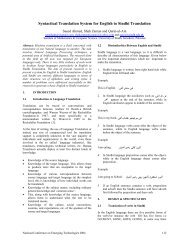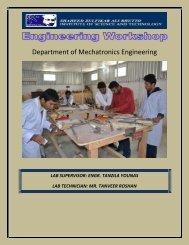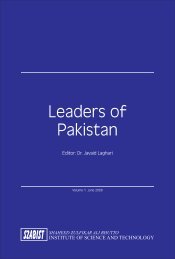Benazir Bhutto - SZABIST
Benazir Bhutto - SZABIST
Benazir Bhutto - SZABIST
You also want an ePaper? Increase the reach of your titles
YUMPU automatically turns print PDFs into web optimized ePapers that Google loves.
she had had just under four hours’ sleep and had woken up with blood in her ears from the effect of<br />
the blast.<br />
“I haven’t felt weepy yet but it suddenly hit me at about 5.30am that maybe I wouldn’t have made it,”<br />
she said. “I kept thinking of the noise, the light and the place littered with dead bodies. Everything<br />
seemed lit up.”<br />
On the wall of the study was a child’s spelling certificate, a reminder that <strong>Benazir</strong> may have been a<br />
politician but was also the devoted mother of Bilawal, 19, Bakhtawar, 17, and Asifa, 14. I saw her<br />
brush her fingers across their photographs when we got back to the house after the Karachi bombing<br />
and I asked what she had said to them.<br />
I knew how hard it had been to hear from my husband that he and our son had seen television pictures<br />
of the explosion and that Lourenço had askedmatter-of-factly: “Do you think Mummy survived?”<br />
“The first thing I thought of after the bomb went off was the children,” she said. She admitted it had<br />
been hard speaking to them that morning.<br />
“They kept saying, ‘Mummy are you okay? Mummy are you okay?’ They had been desperately keen<br />
to come with me, and I said, ‘That’s why I didn’t want you to come.’<br />
“The worst thing is hurting them, making them fearful,” she added. “I feel children need their parents.<br />
Losing my father was the worst thing that ever happened to me and I was 25 – they are still much<br />
smaller. I worry about the effect on them.”<br />
However, she insisted they understood that she had to go back. “My mother comes from Iran and<br />
many of her relatives and friends never went back home, so I used to think I didn’t want to be one of<br />
those people who’d lost their country.”<br />
I will never forget seeing <strong>Benazir</strong> on her bus, like Boadicea riding her chariot, standing at the open<br />
front, refusing the entreaties of her security to stay behind the armour-plated shield. Her cheeks were<br />
flushed with excitement and a speckled dove with an injured leg perched on her shoulder.<br />
“This is why I came back,” she said. “Look at the crowds, the women, the children who have come<br />
from all over. These are the real people of Pakistan, not the extremists.”<br />
In the end she paid the ultimate price. When I got home from Portugal on Friday the first thing I<br />
opened from a pile of post was a Christmas card from <strong>Benazir</strong> sent from Islamabad. It said, “Praying<br />
for peace in the world and happiness for your family in 2008.”<br />
It really made me cry. what they were by channelling weapons to them in Afghanistan’s years of<br />
chaos during the 1990s, and supporting them was an ideology, not just a policy.<br />
When I began investigating reports from contacts that ISI was still supplying arms to the Taliban, the<br />
men in aviator glasses struck. I was arrested at 2.30am in my hotel room, as was Justin Sutcliffe, the<br />
photographer working with me.<br />
We spent the next two days being interrogated in an abandoned bungalow. Fortunately Justin had<br />
managed to smuggle in a mobile phone. While I made a loud fuss to our captors, he phoned from the<br />
toilet for help. Jack Straw, then the foreign secretary, intervened. On the third day we were deported<br />
as a threat to national security. Three months later, after the abduction and beheading of Daniel Pearl,


